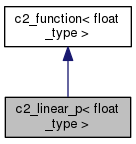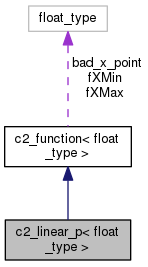|
Geant4
10.03.p03
|
|
Geant4
10.03.p03
|
create a linear mapping of another functionfor example, given a c2_function f More...
#include <c2_function.hh>


Public Member Functions | |
| c2_linear_p (float_type x0, float_type y0, float_type slope) | |
| Construct the operator f=y0 + slope * (x-x0) More... | |
| void | reset (float_type x0, float_type y0, float_type slope) |
| Change the slope and intercepts after construction. More... | |
| virtual float_type | value_with_derivatives (float_type x, float_type *yprime, float_type *yprime2) const |
| get the value and derivatives. More... | |
 Public Member Functions inherited from c2_function< float_type > Public Member Functions inherited from c2_function< float_type > | |
| const std::string | cvs_header_vers () const |
| get versioning information for the header file More... | |
| const std::string | cvs_file_vers () const |
| get versioning information for the source file More... | |
| virtual | ~c2_function () |
| destructor More... | |
| float_type | operator() (float_type x) const |
| evaluate the function in the classic way, ignoring derivatives. More... | |
| float_type | operator() (float_type x, float_type *yprime, float_type *yprime2) const |
| get the value and derivatives. More... | |
| float_type | find_root (float_type lower_bracket, float_type upper_bracket, float_type start, float_type value, int *error=0, float_type *final_yprime=0, float_type *final_yprime2=0) const |
| solve f(x)==value very efficiently, with explicit knowledge of derivatives of the function More... | |
| float_type | partial_integrals (std::vector< float_type > xgrid, std::vector< float_type > *partials=0, float_type abs_tol=1e-12, float_type rel_tol=1e-12, int derivs=2, bool adapt=true, bool extrapolate=true) const |
| float_type | integral (float_type amin, float_type amax, std::vector< float_type > *partials=0, float_type abs_tol=1e-12, float_type rel_tol=1e-12, int derivs=2, bool adapt=true, bool extrapolate=true) const |
| a fully-automated integrator which uses the information provided by the get_sampling_grid() function to figure out what to do. More... | |
| c2_piecewise_function_p < float_type > * | adaptively_sample (float_type amin, float_type amax, float_type abs_tol=1e-12, float_type rel_tol=1e-12, int derivs=2, std::vector< float_type > *xvals=0, std::vector< float_type > *yvals=0) const |
| create a c2_piecewise_function_p from c2_connector_function_p segments which is a representation of the parent function to the specified accuracy, but maybe much cheaper to evaluate More... | |
| float_type | xmin () const |
| float_type | xmax () const |
| void | set_domain (float_type amin, float_type amax) |
| size_t | get_evaluations () const |
| void | reset_evaluations () const |
| reset the counter More... | |
| void | increment_evaluations () const |
| count evaluations More... | |
| bool | check_monotonicity (const std::vector< float_type > &data, const char message[]) const |
| check that a vector is monotonic, throw an exception if not, and return a flag if it is reversed More... | |
| virtual void | set_sampling_grid (const std::vector< float_type > &grid) |
| establish a grid of 'interesting' points on the function. More... | |
| std::vector< float_type > * | get_sampling_grid_pointer () const |
| get the sampling grid, which may be a null pointer More... | |
| virtual void | get_sampling_grid (float_type amin, float_type amax, std::vector< float_type > &grid) const |
| void | preen_sampling_grid (std::vector< float_type > *result) const |
| The grid is modified in place. More... | |
| void | refine_sampling_grid (std::vector< float_type > &grid, size_t refinement) const |
| c2_function< float_type > & | normalized_function (float_type amin, float_type amax, float_type norm=1.0) const |
| create a new c2_function from this one which is normalized on the interval More... | |
| c2_function< float_type > & | square_normalized_function (float_type amin, float_type amax, float_type norm=1.0) const |
| c2_function< float_type > & | square_normalized_function (float_type amin, float_type amax, const c2_function< float_type > &weight, float_type norm=1.0) const |
| create a new c2_function from this one which is square-normalized with the provided weight on the interval More... | |
| c2_sum_p< float_type > & | operator+ (const c2_function< float_type > &rhs) const |
| factory function to create a c2_sum_p from a regular algebraic expression. More... | |
| c2_diff_p< float_type > & | operator- (const c2_function< float_type > &rhs) const |
| factory function to create a c2_diff_p from a regular algebraic expression. More... | |
| c2_product_p< float_type > & | operator* (const c2_function< float_type > &rhs) const |
| factory function to create a c2_product_p from a regular algebraic expression. More... | |
| c2_ratio_p< float_type > & | operator/ (const c2_function< float_type > &rhs) const |
| c2_composed_function_p < float_type > & | operator() (const c2_function< float_type > &inner) const |
| compose this function outside another. More... | |
| float_type | get_trouble_point () const |
| Find out where a calculation ran into trouble, if it got a nan. If the most recent computation did not return a nan, this is undefined. More... | |
| void | claim_ownership () const |
| increment our reference count. Destruction is only legal if the count is zero. More... | |
| size_t | release_ownership_for_return () const |
| decrement our reference count. Do not destroy at zero. More... | |
| void | release_ownership () const |
| size_t | count_owners () const |
| get the reference count, mostly for debugging More... | |
| void | fill_fblock (c2_fblock< float_type > &fb) const |
| fill in a c2_fblock<float_type>... a shortcut for the integrator & sampler More... | |
Protected Member Functions | |
| c2_linear_p () | |
 Protected Member Functions inherited from c2_function< float_type > Protected Member Functions inherited from c2_function< float_type > | |
| c2_function (const c2_function< float_type > &src) | |
| c2_function () | |
| virtual void | set_sampling_grid_pointer (std::vector< float_type > &grid) |
Additional Inherited Members | |
 Protected Attributes inherited from c2_function< float_type > Protected Attributes inherited from c2_function< float_type > | |
| std::vector< float_type > * | sampling_grid |
| bool | no_overwrite_grid |
| float_type | fXMin |
| float_type | fXMax |
| size_t | evaluations |
| float_type | bad_x_point |
| this point may be used to record where a calculation ran into trouble More... | |
create a linear mapping of another function
for example, given a c2_function f
produces a new c2_function F=2.0+3.0*(f - 1.2)
The factory function c2_factory::linear() creates *new c2_linear_p
Definition at line 1972 of file c2_function.hh.
|
inline |
Construct the operator f=y0 + slope * (x-x0)
| x0 | the x offset |
| y0 | the y-intercept i.e. f(x0) |
| slope | the slope of the mapping |
Definition at line 1979 of file c2_function.hh.
|
inlineprotected |
Definition at line 1997 of file c2_function.hh.
|
inline |
Change the slope and intercepts after construction.
| x0 | the x offset |
| y0 | the y-intercept |
| slope | the slope of the mapping |
Definition at line 1985 of file c2_function.hh.

|
inlinevirtual |
get the value and derivatives.
There is required checking for null pointers on the derivatives, and most implementations should operate faster if derivatives are not
| [in] | x | the point at which to evaluate the function |
| [out] | yprime | the first derivative (if pointer is non-null) |
| [out] | yprime2 | the second derivative (if pointer is non-null) |
Implements c2_function< float_type >.
Definition at line 1987 of file c2_function.hh.